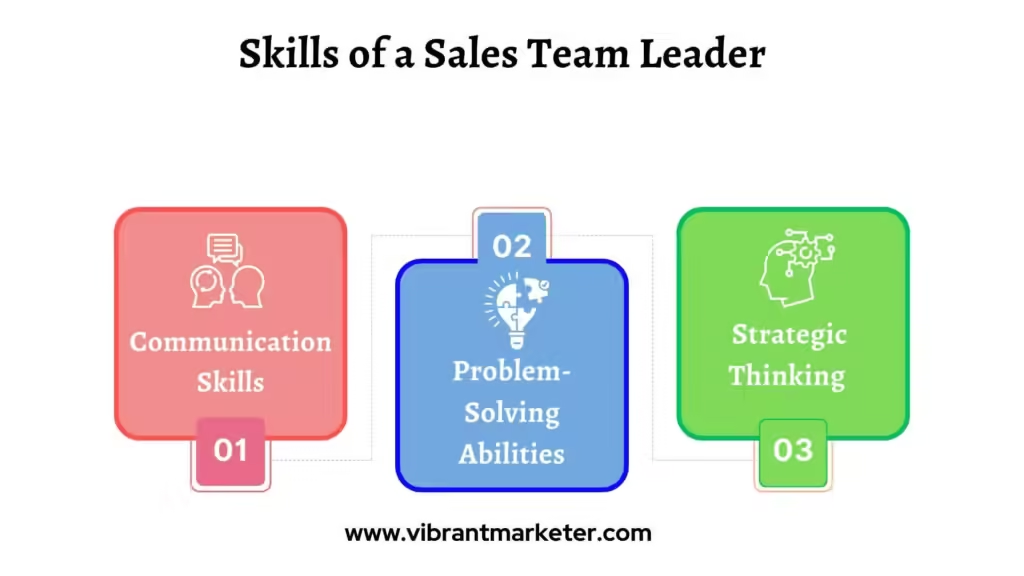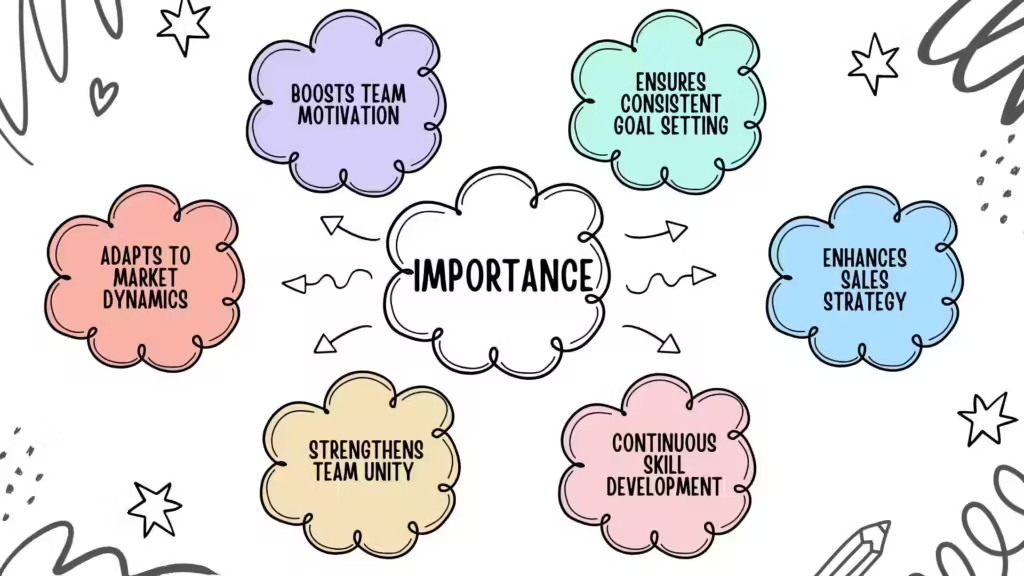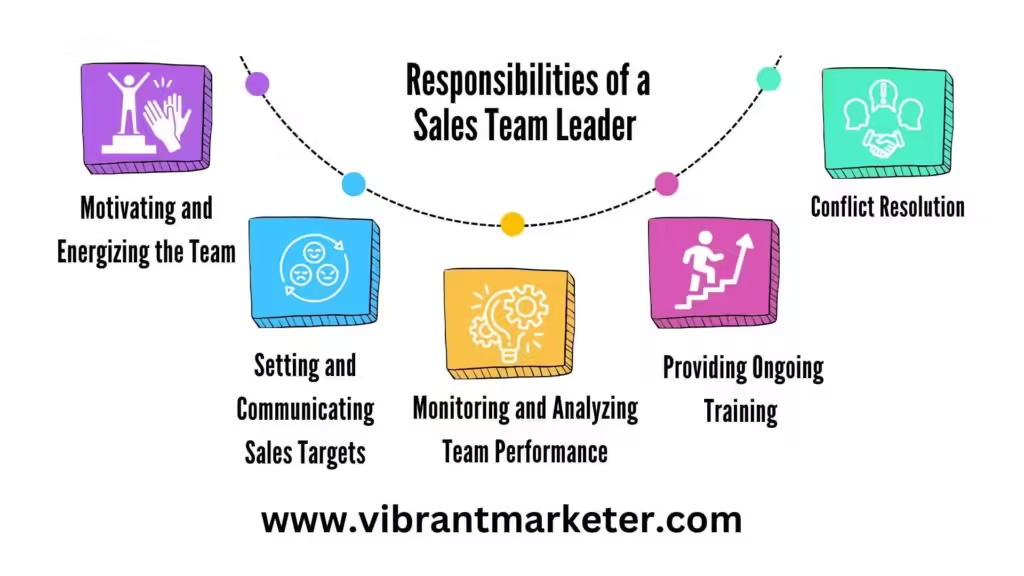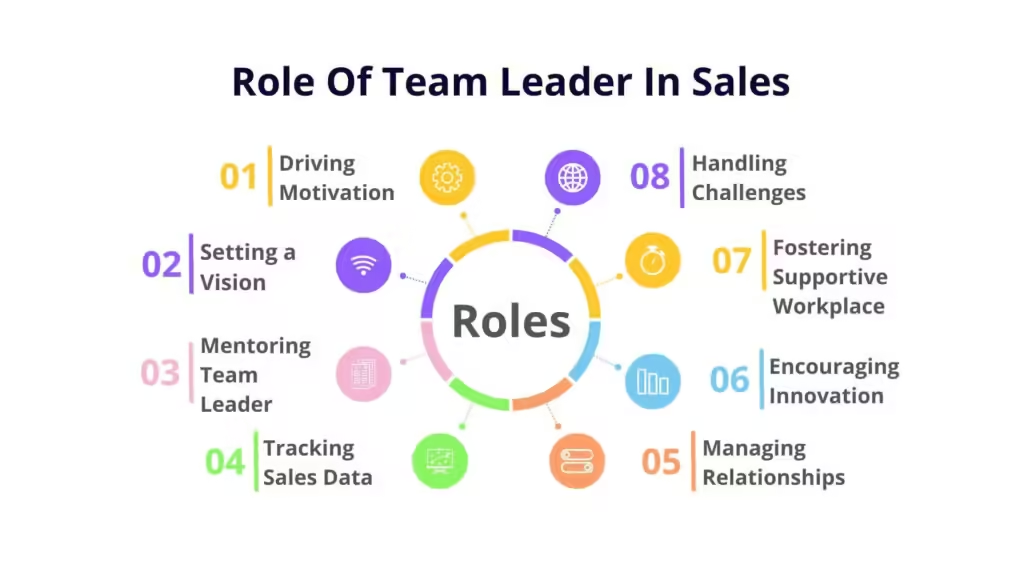
Team Leader in Sales: Detailed Overview
Team Leader in Sales - A Detailed Overview with Real Examples

Essential Skills of a Sales Team Leader
Example : Successful Sales Team Leadership in Action
A prominent example is Rahul, a sales team leader at a tech startup in India. Facing high turnover and low morale, Rahul introduced a mentorship program, where senior team members helped new recruits. This move not only improved team performance but also boosted morale, leading to a 30% increase in sales over six months. Rahul’s leadership and motivational strategies turned a struggling team into one of the company’s top performers.
Examples of Motivational Techniques
For instance, some leaders set up friendly competitions with small rewards, creating excitement around hitting targets. Others hold “Shout Out” sessions to celebrate individual achievements, which boosts morale and motivates the team to perform better.

Communication Skills
A strong team leader must communicate effectively, ensuring the team understands strategies, goals, and individual responsibilities.
Problem-Solving Abilities
Sales are unpredictable; challenges are common. Leaders need to think on their feet, finding quick solutions that minimize disruptions.
Strategic Thinking
Sales team leaders analyze market trends and adjust strategies to stay competitive. Their strategic vision helps the team navigate the dynamic sales environment.
Importance of a Sales Team Leader

- Boosts Team Motivation and Morale
A motivated sales team is more likely to reach or exceed targets. A sales team leader plays a crucial role in keeping morale high, especially during challenging times. For instance, Rahul from Indian startup UrbanClap often organized recognition events and “shout-outs” to celebrate small wins. By fostering a culture of recognition, the company observed a 20% increase in employee engagement, ultimately leading to higher customer satisfaction and retention rates. - Ensures Consistent Goal Setting and Alignment
Setting clear, attainable goals keeps the team aligned and focused on common objectives. Leaders in HDFC Bank’s sales division, for instance, focus on segment-based targets. Through weekly goal-tracking meetings, they can adjust strategies, which has helped boost their loan sales by 15% over the past quarter. - Enhances Sales Strategy and Execution
Leaders analyze market trends and develop actionable sales strategies. At PepsiCo, team leaders play an active role in identifying regional preferences. This strategic focus on localized tastes helped PepsiCo increase its market share in India by 10% within two years. Leaders often adapt their team’s strategies according to real-time feedback, which is crucial in competitive markets. - Facilitates Continuous Skill Development
Continuous development helps a team stay competitive. At IBM, leaders frequently organize sales skill workshops for team members, focusing on improving their pitch, negotiation skills, and understanding of customer needs. These efforts have resulted in a 25% boost in closing rates. - Strengthens Team Unity and Cohesion
A sales team that feels unified works more effectively together. At Zomato, team leaders organize team-building activities, which increase trust and collaboration. By fostering a supportive environment, leaders minimize internal conflicts and improve team performance, which ultimately reflects in their consistent revenue growth. - Adapts to Market Dynamics
Leaders help teams adapt quickly to changing market conditions. At Amazon India, team leaders are trained to help the sales force adapt to fast-evolving consumer trends. For example, during the Diwali season, leaders play a pivotal role in guiding their teams on how to cater to increased demand, boosting their festive season sales by 30%.
Core Responsibilities of a Sales Team Leader

- Motivating and Energizing the Team
Motivation is key to sustaining performance. Leaders like those at Unilever actively create a positive atmosphere, organizing “win of the week” meetings to celebrate sales wins and maintain high energy levels. As a result, Unilever’s sales teams are consistently recognized for productivity and enthusiasm. - Setting and Communicating Sales Targets
Clear targets provide direction. Leaders at ICICI Bank, for instance, break down annual targets into monthly and weekly goals, which make them more achievable. This step-by-step approach has increased their loan sales productivity by 18% year-over-year. - Monitoring and Analyzing Team Performance
Tracking metrics helps leaders identify areas for improvement. Leaders at Salesforce use CRM tools to monitor team performance in real-time, which allows them to quickly address challenges and support team members. This proactive approach has led to a 20% improvement in customer acquisition rates. - Providing Ongoing Training and Development
At Maruti Suzuki, sales leaders prioritize continuous learning for their team members through regular training. By offering workshops in negotiation and customer engagement, Maruti Suzuki has managed to increase customer satisfaction rates, leading to a 15% increase in repeat sales. - Conflict Resolution and Problem Solving
Handling disputes effectively maintains a healthy work environment. Leaders at Reliance Jio resolve conflicts by using a collaborative approach, encouraging open dialogue. This has helped maintain a highly collaborative team culture, essential for rapid response to market demands.
What is the Role of a Team Leader in Sales

1. Driving Individual and Team Motivation
2. Setting a Vision and Sales Strategy
3. Mentoring and Developing Team Members
4. Tracking Sales Data and Performance Metrics
5. Managing Stakeholder Relationships
6. Encouraging Innovation and Adaptability
7. Fostering a Supportive and Inclusive Workplace Culture
8. Handling Challenges and Conflict Resolution
For example, if two team members have conflicting views on a sales approach, a good leader encourages a collaborative solution, fostering a sense of unity and encouraging mutual respect.
How to Become a Sales Team Leader
Becoming a sales team leader is a rewarding journey that combines sales expertise, leadership skills, and strategic thinking. Here’s a step-by-step guide on how to make this transition successfully, whether you’re starting your career in sales or already a part of a team and looking to advance.
- Build a Strong Foundation in Sales
- Start with Sales Experience: A solid sales foundation is essential. Many leaders begin as entry-level sales representatives, gradually advancing as they excel. Practical experience provides you with insights into the challenges and successes of the sales cycle, which are critical when leading others.
- Demonstrate Consistent Performance: Hitting and exceeding targets consistently shows reliability, commitment, and capability – qualities that are essential in leadership.
- Develop Key Sales Skills
- Master Communication and Negotiation Skills: Sales leaders need to communicate effectively with both clients and team members. Enhancing negotiation skills is also important as it’s a major part of closing deals and helping team members refine their techniques.
- Learn Data Analysis and CRM Tools: Sales leaders often rely on data from CRM (Customer Relationship Management) tools to guide decisions, so familiarity with systems like Salesforce or HubSpot can give you an edge.
- Understand Customer Needs: Leaders need to ensure their team members understand and meet customer needs. Knowing how to research customer preferences and respond accordingly is an invaluable skill.
- Embrace Leadership and Management Training
- Seek Out Leadership Training Programs: Many companies offer leadership training programs to promising sales reps. This can be in the form of workshops, online courses, or in-person sessions, covering topics like team management, conflict resolution, and effective communication.
- Practice Delegation and Coaching: Sales leaders need to delegate tasks effectively and coach team members. Begin by mentoring less-experienced colleagues or taking on small leadership responsibilities within your team.
- Build Emotional Intelligence (EI): EI is crucial for understanding team members’ motivations and managing team dynamics. Leaders with high EI foster trust, loyalty, and collaboration.
- Cultivate a Strategic Mindset
- Set Long-Term Goals: Sales team leaders must think beyond short-term quotas. Developing a strategic mindset by setting long-term goals and aligning them with company objectives is essential.
- Analyze Market Trends: Understand market trends to guide your team effectively. For instance, if you’re in retail, knowing seasonal sales patterns helps your team anticipate demand and adjust strategies.
- Focus on Team Building and Collaboration
- Create an Inclusive Environment: Successful leaders create environments where everyone feels valued. Recognize each member’s strengths, promote diversity, and encourage open communication.
- Encourage Collaboration and Peer Learning: Foster a culture where team members can share ideas, support one another, and learn together. This strengthens team dynamics and enhances overall performance.
- Set an Example of Professionalism and Ethics
- Set the Standard: Demonstrate commitment, reliability, and integrity in everything you do, as your actions create the team’s foundation.
- Show Respect and Empathy: Demonstrating respect and empathy builds trust and morale within the team. Sales leaders who prioritize people as well as results create positive work environments.
- Prepare for the Challenges of Sales Leadership
- Adapt to Changing Markets: Sales environments can change rapidly. Being adaptable is essential for guiding your team through shifts in customer preferences, economic changes, or industry disruptions.
- Handle Pressure Effectively: Sales can be a high-stress field, and a leader’s ability to stay calm and focused under pressure can inspire the team to do the same.
- Gain Certification or Advanced Education (Optional)
- Consider Certifications: Pursuing certifications like Certified Sales Leader (CSL) or Sales Leadership Program (SLP) can provide a competitive edge. These programs cover advanced sales leadership techniques and strategic decision-making.
- Get a Degree in Business or Management: Some leaders pursue formal education in business, management, or a related field to enhance their skills and understanding of leadership in a broader business context.
Tips for Aspiring Sales Team Leaders
- Practice Empathy – Understanding your team’s perspective can make you a more effective leader.
- Stay Data-Driven – Leverage data to make decisions that boost team performance.
- Adapt to Change – Sales trends shift; stay flexible to stay ahead.
- Encourage Open Communication – Foster trust by encouraging honest conversations within the team.
- Celebrate Small Wins – Recognize achievements to keep morale high.
- Invest in Continuous Learning – Improve your leadership skills through courses and mentorships.
- Foster Team Spirit – Use team-building activities to strengthen relationships.
- Listen Actively – Pay attention to feedback to continually improve as a leader.
- Set Clear Expectations – Ensure everyone understands their role and responsibilities.
- Encourage Innovation – Let your team experiment with new ideas and strategies.
The Impact of Technology on Sales Leadership
- How CRM Tools are Transforming Sales Leadership CRM (Customer Relationship Management) tools like Salesforce and HubSpot have become essential for modern sales leaders. These tools store customer information, track sales activity, and provide valuable insights into customer behavior, making it easier for leaders to understand and anticipate client needs. For instance, leaders at Tata Consultancy Services (TCS) use CRM analytics to prioritize customer interactions, boosting their customer retention rate by 15% over the past year.
- Sales Automation and Increased Productivity
Sales automation tools streamline repetitive tasks like data entry, follow-ups, and email marketing, freeing up time for sales teams to focus on high-value tasks. HDFC Bank, for instance, uses sales automation to manage their leads more efficiently, helping them convert potential clients at a faster rate. Leaders leverage this efficiency to allocate resources better and increase team productivity. - AI in Enhancing Decision-Making and Predictive Analysis
Artificial Intelligence (AI) has brought data-driven decision-making to the forefront of sales leadership. By analyzing past sales patterns, AI helps leaders at Flipkart predict future trends, optimize inventory, and even tailor product recommendations. This tech-driven insight enables leaders to make more informed strategic decisions, ultimately benefiting the business and team performance. - Leveraging Technology to Foster Better Team Collaboration
Collaboration tools like Microsoft Teams and Slack help sales leaders maintain communication and collaboration, especially for remote teams. For example, sales leaders at Infosys use these platforms for regular check-ins, performance tracking, and training sessions, helping to keep team alignment and momentum even when working remotely.
How Emotional Intelligence Shapes Effective Sales Leadership
- Building Stronger Relationships with Empathy
Empathy allows leaders to connect deeply with their team members, building trust and loyalty. For instance, leaders at Mahindra & Mahindra have developed training programs focused on empathy and active listening. This empathetic approach has not only improved team morale but has also led to a 20% increase in employee retention. - Importance of Active Listening in Leadership
Leaders who listen actively can better understand their team’s challenges and motivations. At Nestlé India, leaders who practice active listening have reported fewer conflicts and smoother team dynamics, which translates to better productivity and sales performance. - Self-Awareness as a Key Leadership Trait
Self-aware leaders understand their strengths and areas for improvement, which helps them relate to their team honestly and authentically. This awareness can foster a culture of trust, as seen at Marico, where leaders encourage open feedback and self-reflection sessions, positively impacting team engagement.
Why Diversity and Inclusion Matter in Sales Teams
- Benefits of a Diverse Sales Team
Diversity brings different perspectives, which can enhance problem-solving and innovation. For example, PepsiCo has a diverse sales team, leading to creative sales strategies that resonate with various customer segments. This diversity has contributed to their brand’s broad appeal and market success. - Creating an Inclusive Environment
Inclusive environments make every team member feel valued and respected. Leaders at Wipro focus on creating inclusivity by celebrating cultural events and fostering open dialogue. This inclusive approach has strengthened team unity, as evidenced by improved collaboration and customer satisfaction. - Promoting Equal Opportunities
Leaders can support equal opportunities by ensuring fair treatment for all team members. At Unilever, leaders have specific diversity and inclusion goals, including mentorship programs for underrepresented groups. This approach has helped create a culture where all voices are heard, fostering a positive team environment.
The Future of Sales Leadership
- Remote Leadership and Virtual Coaching
With more teams working remotely, leaders are adapting by providing virtual coaching and support. Companies like Amazon have invested in remote training programs to keep teams aligned and motivated, regardless of location. This shift has made remote leadership skills increasingly valuable. - Adaptability and Agility in Changing Markets
As markets evolve, future leaders will need to be highly adaptable. At BYJU’s, leaders stay agile by constantly updating their strategies based on new trends and customer feedback. This adaptability is essential for staying relevant in the competitive ed-tech market. - Importance of Data-Driven Decision-Making Skills
Data literacy will be a key skill for future sales leaders. Leaders at Paytm utilize data insights to predict customer behavior and make smarter business decisions. This data-driven approach is essential for competing in a fast-paced digital landscape. - Emphasizing Continuous Learning
Future leaders will prioritize continuous learning to keep up with technological advancements and market trends. Organizations like Infosys promote learning through workshops and certifications, encouraging leaders to develop new skills that can enhance team performance






